WATCH LIVE: CNN's Democratic debate
begin quote from:
Commentators: Who won the Democratic debate?
A good night for Warren and Buttigieg
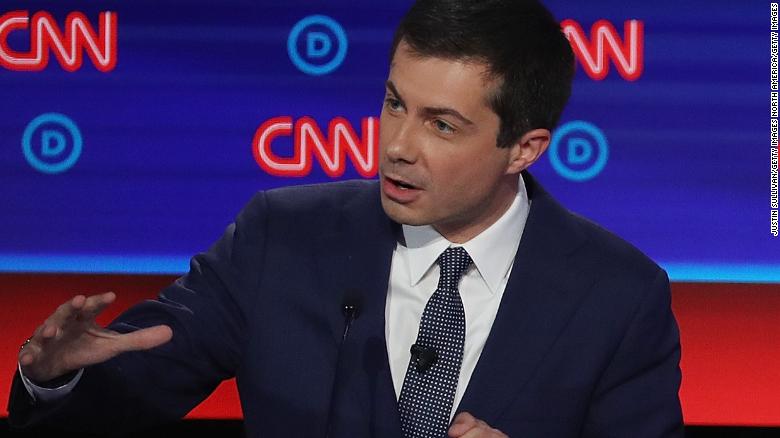
If debates alone determined the outcome of a presidential primary, Elizabeth Warren and Pete Buttigieg would be celebrating their one-two finish. But it is unlikely the first night of the Detroit face-offs will have the impact of shaking up this field.
Sen. Warren was strong. She used her time to go big and bold with policy ideas and some effective hits on President Trump, as well as easy targets, like banks and insurance companies. And she effectively punched back when warranted, delivering the line of the night in response to Rep. John Delaney: “I don’t understand why anybody goes to all the trouble of running for president of the United States just to talk about what we really can’t do and shouldn’t fight for.”
My bet is her supporters, and maybe some of Bernie Sanders’, will love her more, but the skepticism among many Democrats that she is the candidate who can defeat Donald Trump won’t have dissipated.
As for Mayor Pete Buttigieg, while he reminded viewers why he has had such a meteoric rise in the polls, it is unlikely his performance changed his lagging support among African Americans.
On his first night on the debate stage, Steve Bullock accomplished what John Hickenlooper, Amy Klobuchar and John Delaney fell short on: he offered a different approach to the Sanders and Warren vision. But he may be arriving too late to gain enough movement in the polls and traction among grassroots supporters to make the next debate in September.
Jen Psaki, a CNN political commentator, was the White House communications director and State Department spokeswoman during the Obama administration. She is vice president of communications and strategy at the Carnegie Endowment for International Peace. Follow her on Twitter: @jrpsaki.
Democrats are heading for a repeat of 2016
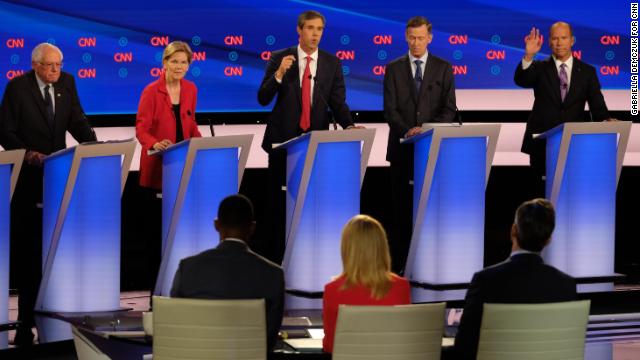
Tuesday’s Democratic debate highlighted how the left’s divide between socialism and pragmatism in 2016 is still alive and well in the 2020 presidential primary. This policy schism -- as Valerie Jarrettand Rahm Emanuel have noted -- empowers President Donald Trump, who enjoys the stability of a unified Republican Party and the power of incumbency.
Trump also benefits from most Americans’ staunch opposition to liberal policies like free health insurance for immigrants with no legal right to be here and eliminating private health insurance.
More practical candidates on the stage, like Gov. Steve Bullock, former Gov. John Hickenlooper and Rep. Tim Ryan tried to be voices of reason on issues like health care, immigration, student loans and the “Green New Deal,” but the aggressive pushback from Sens. Bernie Sanders and Elizabeth Warren shows how the 2020 Democratic primary could easily become just as bruising as it was in 2016.
Moderates like Rep. John Delaney called for consumer choice. He warned against pursuing an “anti-private sector strategy” in health care that could bankrupt rural providers and making “impossible promises that will turn off independent voters.” Yet he was knocked back by leftists onstage like Marianne Williamson who dismissed the more centrist candidates: “I almost wonder why you’re Democrats.”
Bureau of Labor Statistics data show the US economy has added over 500,000 manufacturing jobs since President Trump took office and wage gains on an annual basis have been above 3% for 16 of the past 18 months. Ryan correctly noted that the far left often bashes petro-and coal-based industries, yet workers in these fields are the backbone of America’s economy -- which has added more than 47,000 auto manufacturing jobs since Trump was elected.
It’s no wonder that Middle America rejected liberal policies like those of Hillary Clinton, who declared, “We’re going to put a lot of coal miners and coal companies out of business.” While she -- and others tonight -- quickly tried to amend her statement by saying she would re-train those coal workers, the damage was already done. It’s no surprise that Clinton said that statement was the one she regretted the most in 2016.
It appears the 2020 Democrats have learned nothing, allowing conservatives to step into this leadership void to offer market-based solutions for reducing emissions and lowering energy costs.
In his remarks Tuesday, Hickenlooper called for "evolution, not revolution,” however, the Democratic base doesn’t seem to agree with him. They are likely in for a bitter surprise when America’s common-sense voters reject policies that would expand government at unsustainable levels.
Carrie Sheffield, a conservative commentator, is the founder of Bold, a digital news network committed to bipartisan dialogue. She is also national editor for Accuracy in Media, a conservative media watchdog organization, and a visiting fellow at Independent Women's Forum. Follow her on Twitter: @carriesheffield
Struggle for the soul of the Democratic party
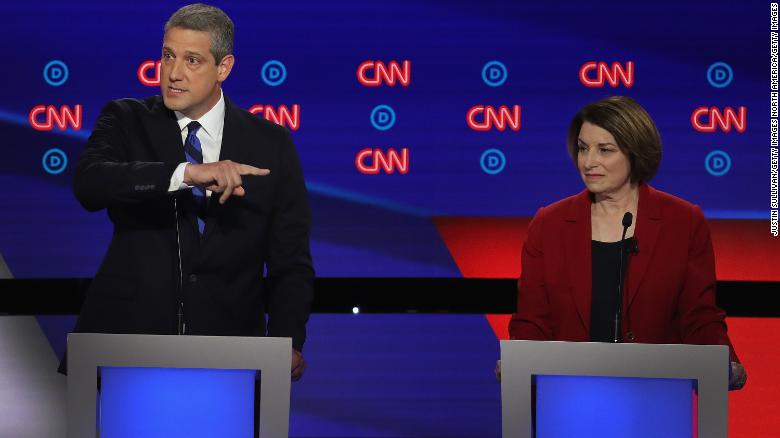
There were no break-outs, no serious stumbles, no ambushes like we saw in the first round of Democratic debates a few weeks ago. But Tuesday’s opener in the second round did have significance: the moderates of the Democratic Party finally found their collective voice.
After those first debates, there was an audible shudder among many Democratic strategists and activists who worried that the far left of the party was seizing control, that Trump was successfully undermining the party with his racist attacks, that Joe Biden’s halting performance raised questions about his age, and that there was no Plan B if Biden stumbled again. Despite polls to the contrary, many worried they were on the road to doom.
Thanks largely to the arrival of Montana Governor Steve Bullock on stage and a better performance by Maryland Congressman John Delaney, the moderates’ push for less revolutionary, more realistic policy changes sent a message to the broader public that the party hasn’t lost its way but is having a healthy debate about what that way that should be. Bullock was an especially fresh voice of common sense that will appeal in large swaths of the country.
By the end of the evening, what emerged on stage was a coalition of five moderates: Bullock, Delaney, Amy Klobuchar, Tim Ryan, and John Hickenlooper. No doubt some will disappear before the third round and there will be fewer moderates among the debaters tomorrow night. But the struggle for the soul of the Democratic Party has now been joined for all to see. Some party chieftains may not like the struggle, but ultimately it could be exactly what the party needs to forge stronger bridges across the divide.
David Gergen has been a White House adviser to four presidents and is a senior political analyst at CNN. A graduate of Harvard Law School, he is a professor of public service and director of the Center for Public Leadership at the Harvard Kennedy School. Follow him on Twitter: @David_Gergen
Steve Bullock: an appealing alternative to Biden?
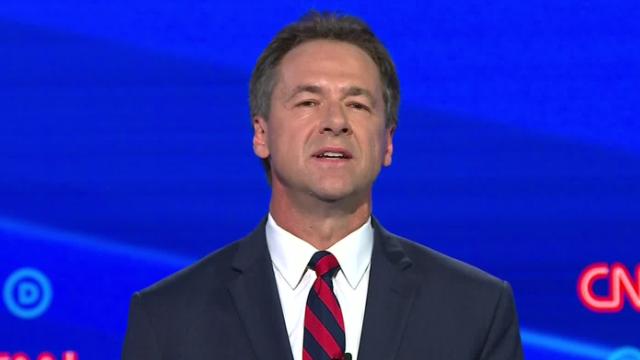
Governor Steve Bullock is presenting himself as the progressive who can win in red states (like he did in his home state of Montana). It is smart framing given the fact that he is embracing more moderate policies such as building on the Affordable Care Act rather than providing Medicare for All -- and NOT decriminalizing illegal border crossings. He managed to do both by tying himself to former President Barack Obama’s administration.
Most of us have not seen Governor Bullock on a national stage until tonight. But, with a strong performance in the debate and an embrace of more moderate policies, he is providing a viable alternative to the other more moderate candidate who calls himself a progressive and cloaks himself with the Obama administration – former Vice President Joe Biden. For those Democratic voters who viewed Biden’s debate performance last month as lackluster, Bullock will be appealing.
Patti Solis Doyle, a CNN commentator, was an assistant to the President and senior adviser to then-first lady Hillary Clinton, was chief of staff on Clinton's 2000 and 2006 Senate campaigns, and Clinton's presidential campaign manager in 2007 and early 2008. She is president of Solis Strategies, a Washington-based consulting firm that specializes in serving nonprofits, nongovernmental organizations and corporations. Follow her @pattisolisdoyle.
Debaters let Trump off easy
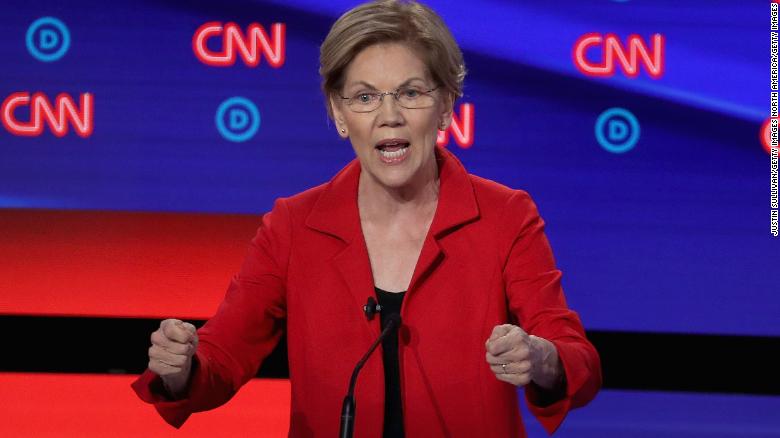
Donald Trump has proposed deep cuts in Medicaid and Medicare. He is in court right now, trying to repeal the Affordable Care Act and its protections for folks with pre-existing conditions. You would think the mission of the opposition party is to, well, oppose those things. But no Democrat mentioned them at Tuesday's debate. They were too busy accusing each other of being donkeys in elephants’ clothing.
Elizabeth Warren was on fire. Her blazing rhetorical skills outshone Bernie Sanders without ever attacking him. It was impressive, and, for me, maddening. More than once she turned to her fellow Democrats -- good, strong, loyal progressive Democrats; Democrats whose support she will desperately need if she is the nominee -- and accused them of repeating Republican talking points.
Montana Governor Steve Bullock and former Maryland Congressman John Delaney did a good job of challenging the more, umm, fanciful proposals from Warren and Sanders: free college, free health care, single-payer weed. (Okay, I made that last one up, but stay tuned; it will be canon by the end of this primary).
Paul Begala, a Democratic strategist and CNN political commentator, was a political consultant for Bill Clinton's presidential campaign in 1992 and was counselor to Clinton in the White House. Follow him on Twitter: @PaulBegala
Bullock offered a way out of partisan divides
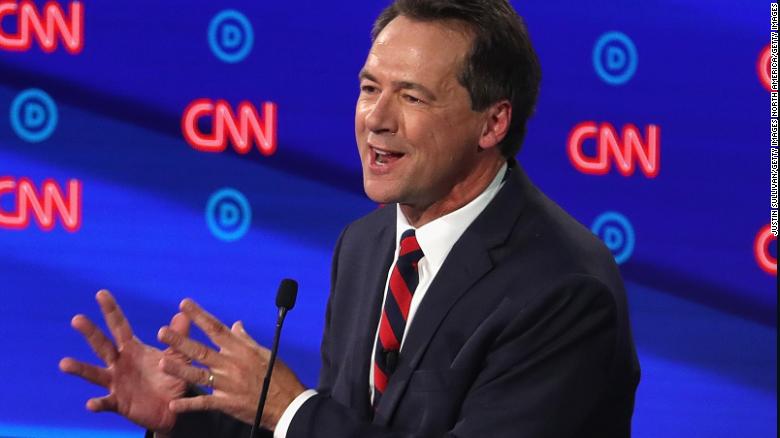
Montana Governor Steve Bullock came out of the gate strong in his first appearance on the Democratic debate stage. On a night that crystallized the policy differences between the left and center, Bullock spoke with credibility as the only presidential candidate to have won in a state that Donald Trump carried by 20-points.
He’s an easy target for the Twitterati to dismiss as a red-stater out of step with the party’s progressive wave. But with an opening statement that slammed “wish-list economics,” Bullock represents an almost forgotten tradition that scrambles the divisions that have come to define our times: he’s a western progressive, someone who has taken on big-money special interests while defending farmers and rural families who just "want a fair shot.”
He framed questions by blowing past the either-or divisions, surprising Bernie Sanders by pointing to his background as a union-side labor negotiator before becoming his state’s attorney general. He’s a gun owner and hunter who briefly silenced the audience by making the gun violence epidemic personal, citing the death of his 11-year old nephew on a school playground.
He defended the public option expansion of Obamacare over the actual government takeover of health care through the elimination of private insurance. He talked about the reality of climate change by pointing out that the fire season is now 80 days longer. And he dismissed the talk of decriminalizing border crossings as “playing into Trump’s hands.”
So much of the partisan debates of the day are not actually red state versus blue state, but urban versus rural. A two-term red state Democratic governor offers a way out of those divides. He brought to the debate stage the great practical benefit of executive experience and a degree of empathy for Trump voters that can help flip back pivot counties and begin to heal the great divides that are hurting our country.
He had some stumbles and could seem stilted and there’s a long road ahead to even the second tier of candidates. But he offers a practical perspective that’s been missing from Democratic debates.
Steve Bullock is still barely known but that should change after a confident performance that offers a vision of an America that doesn’t need to be hopelessly divided between red states and blue, urban and rural.
John Avlon is a CNN senior political analyst and anchor. Follow him on Twitter: @JohnAvlon.
No comments:
Post a Comment